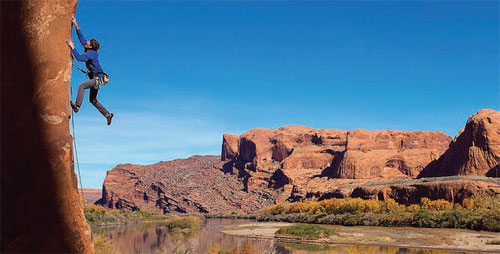By Brice Wallace
What happens outside the buildings of Corporate Utah sometimes has as much influence as what occurs inside.
Access to Utah wilderness and outdoor recreation play a key role in some companies’ decision to put operations in the state and their ability to attract and retain employees, according to speakers at a recent webinar.
A survey in 2018 by the Kem C. Gardner Policy Institute indicates that the top reason that leaders of fast-growing Utah businesses put their businesses in Utah was the ability to attract and retain workers. But coming in second was Utah’s outdoor lifestyle and third was access to a variety of outdoor recreation.
“They all believed — 100 percent believed — that Utah’s outdoors and outdoor recreation are essential to Utah’s quality of life,” Marin Christensen, research associate at the institute, said at the recent Summit Speaker Series, an extension of the Utah Outdoor Summit. “Almost all believed it is essential to Utah’s economy and helps attract high-quality employees and good jobs to Utah.”
Christensen said the yet-to-be-released results of another survey shows that among the more than 250 surveyed tech-sector employees, “Utah’s outdoor recreation and access to wilderness was not only the main recruitment tool used to attract them here, but it was also the most important factor for them living here,” she said. “According to these high-skilled employees, Utah’s outdoors matters in their decision to relocate to join your company.”
The results also indicate that of Utah natives who left the state, many who returned cited outdoor recreation as a key factor for doing so.
“The natives that have moved away and came back to Utah cited the outdoors as the most important factor in their decision to do so,” Christensen said.
Stephanie Pack, business development manager at the Economic Development Corporation of Utah, said lots of companies from every industry are considering Utah as a location for operations, and “one of the biggest reasons that is happening is because of the outdoor assets.”
Some business executives tell the organization that they leverage Utah’s outdoor assets as an employee recruitment tool, she said.
“It’s a big reason why a lot of these companies came to Utah, why they started here,” Pack said. “We’re seeing a lot of Utah transplants that left the state, looking to come back, looking to bring their businesses back, looking to expand their businesses here. A lot of CEOs have homes in Park City. Why? Because of the resorts there, because of the recreation assets there.”
Utah’s growing reputation as a place to enjoy the outdoors “supersedes some of the misconceptions, some of the cultural aspects that people point to when you talk about Utah,” she said.
“I think for a long time, the rhetoric was, ‘Oh, Utah doesn’t have a nightlife, it doesn’t have a night scene, and that’s something that’s important to our employees.’ Well, a lot of that sentiment has shifted. They don’t necessarily care as much for the night scene as long as they can hit a trail, as long as they can get their season passes and as long as they can get outside.”
Christensen quoted one business owner from the 2018 survey who said that “without the outdoors, we’re North Dakota or Mississippi.”
Company leaders should understand that highly skilled employees considering a move to Utah value outdoor recreation, Christensen said. For outsiders considering other states, “even if people may not like Utah’s cultural reputation, the outdoors still have sway and puts us over the edge,” she said.
Kelly Stowell, executive director of the Center for Education, Business & the Arts in Kanab, said developing more outdoor recreation options is a goal for the area, which could benefit if visitors return and bring their companies with them or if local entrepreneurs start and grow their businesses by catering to outdoor-lovers. And the pandemic-prompted trend of working from home — the so-called “digital nomads” — “goes hand-in-hand with outdoor recreation,” he said.
Stowell said the Kane County area wants to be known as “Silicon Sands.”
“We’re seeing it happen where these grains of sand blow into the community and they contribute to the overall dune, but they don’t take away from it,” he said.
One of those local entrepreneurs is Doug Stilson, who with wife Camie owns Cup of Joes, a coffee shop that opened in 2017 in Orangeville. Its business has grown every year, bolstered by people who take to the landscape for climbing, bouldering and even studying geology, he said.
The shop includes a map sprinkled with pins showing the origins of its visitors. So far, the pins represent more than 70 nations. “We think that’s pretty cool,” Stilson said.
“One thing that we didn’t know was so prevalent,” he said, “was how many people from all over the world come to our little neck of the woods.”
The Summit Speaker Series is offered by the Utah Office of Outdoor Recreation, in partnership with Snowsports Industries America, the Economic Development Corporation of Utah and the Utah Outdoor Association. Its next event, “Inclusion in the Winter Industry: An Inclusive Approach to Hiring and Retaining Employees,” takes place Feb. 25, noon-1 p.m., online via Zoom.








